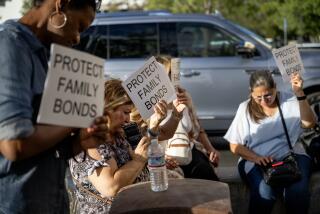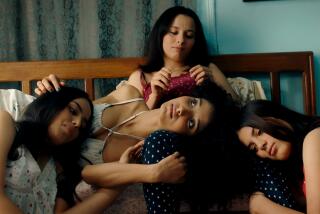Writing the Book on the Torah From a Female Perspective
- Share via
To explain the significance of the new Torah commentary she is working on, Bible professor Tamara Cohn Eskenazi invokes the tale of Zelophehad’s daughters.
The reference draws a blank stare--which is precisely what motivates her.
The story of Zelophehad’s daughters is a tale of five sisters who won the right--previously limited to men--to inherit their father’s land. They accomplished the rare feat of convincing God to create a new law, yet their triumph is relegated to the margins of Torah editions.
For Eskenazi and other feminist Bible scholars, the scant attention paid to Zelophehad’s daughters illustrates how women have been overlooked by male-authored commentaries on the Torah.
So, like the five sisters who challenged tradition and won a more just system for all, a group of female scholars headed by Eskenazi plans to rewrite the book, so to speak, on the Torah.
Over the next five years, the women plan to compile a commentary on the Torah--the first five books of the Old Testament Bible--that will highlight female figures.
Eskenazi, a Bible professor at Hebrew Union College-Jewish Institute of Religion in Los Angeles, is editing the commentary. She says the writers will challenge centuries of male-dominated Torah interpretations, but in traditional form.
For centuries, the Torah has been printed with the biblical passage in the center of a page, surrounded by interpretations from commentators of different eras and viewpoints. The women’s commentary will employ that layout, but all commentators will be female.
The commentary project is sponsored by Women of Reform Judaism-the Federation of Temple Sisterhoods, a group representing more than 600 temple women’s groups in 15 countries.
It was commissioned because the group believes male scholars have missed the richness and subtlety of women’s roles in the Bible, including the complexity of family relationships in Bible stories and the heroic acts of women in the Bible.
“The decision came from a community of women who said we want our Torah, a commentary that speaks to us,” Eskenazi said.
In the case of Zelophehad’s daughters, for example, Eskenazi said the prevalent Torah commentary used in Reform congregations today deals with the story in “four or five lines. We will spend four pages on it.”
Another woman in the Bible often overlooked, Eskenazi said, is the prophet Huldah. It was on Huldah’s authority that the book of Deuteronomy was recognized as the word of God in the 7th century BC. “No other prophet aside from Moses was as successful, yet most contemporary readers are not even aware of her story,” Eskenazi said.
Huldah’s story would appeal to a contemporary audience for another reason, the scholar said. While Huldah was a revered prophet, her husband, Shallum, was keeper of the King’s wardrobe. Eskenazi sees their story as “a wonderful example of two professional people and how they divide their roles. She’s a public figure, he takes care of the clothes.”
Examples From Exodus
She also cites the women in Exodus as characters who deserve more attention and are especially relevant to women today. “When Miriam and the daughter of Pharaoh rescue Moses together, they cross religious, national and class boundaries, all for the sake of life,” she said. Their act is also an example of nonviolent resistance to tyranny, she said.
There have been previous women’s commentaries on the Torah, but Eskenazi said those works analyzed selected passages; this work, she said, will go through the entire Torah paragraph by paragraph.
She said the new commentary will also include literary criticism, sociology and history in its examination of the text. Letters were sent this month to 100 scholars inviting them to submit material for the commentary.
Such an ambitious undertaking is possible because there is finally a “critical mass” of Jewish female biblical scholars and rabbis to draw upon. Though contributors have decades of experience, “almost everyone is a pioneer. In fact, almost everyone is a ‘first’ in her field,” Eskenazi said.
Eskenazi was the first woman appointed to the rabbinical faculty at Hebrew Union College-Jewish Institute of Religion, in 1990. Her own story reflects the difficult balancing act maintained by many women in her generation.
She emigrated from Israel to New York as a teenager, then left architecture school after one year to get married. She was widowed shortly after that, remarried, and moved to Denver with her second husband. While raising five children, she took college classes in her free time, finishing her bachelor’s degree in 20 years.
During those years as a full-time mother and part-time student, Eskenazi, who grew up in a mildly religious household, sharpened her academic interest in the Bible.
“Raising my children, I needed access to wisdom, and how-to books did not do it for me. I needed the depth of wisdom accumulated over centuries,” she said.
When her children were grown, Eskenazi entered graduate school, and got her PhD “two years before my daughter got hers.”
Today, the professor who once sought wisdom from the Bible to guide her through parenthood hopes to create a work that will allow the work of women to inspire others.
“The Bible is full of strong, exciting women who have been relegated to the shadows, either by the Bible itself or by later interpreters. Our commentary will bring them out of the shadows into the limelight where they belong.”
More to Read
Sign up for our Book Club newsletter
Get the latest news, events and more from the Los Angeles Times Book Club, and help us get L.A. reading and talking.
You may occasionally receive promotional content from the Los Angeles Times.










